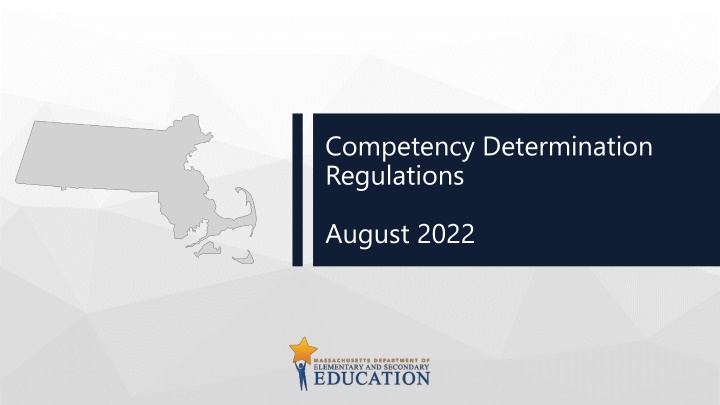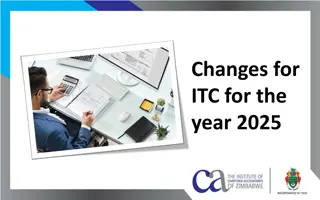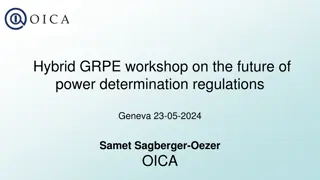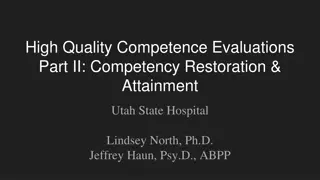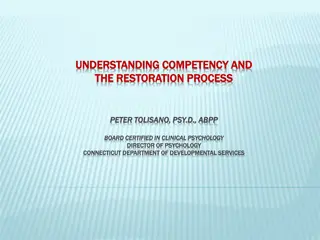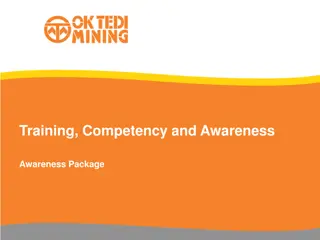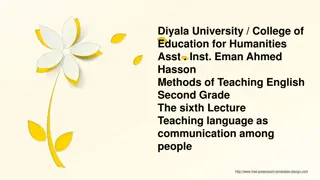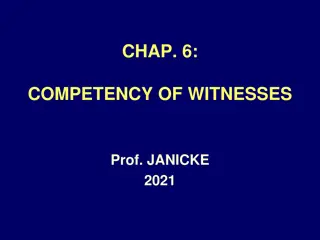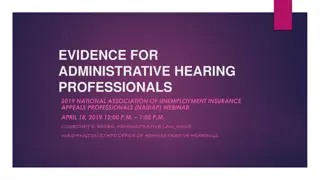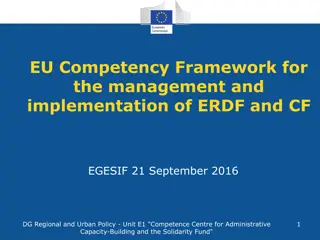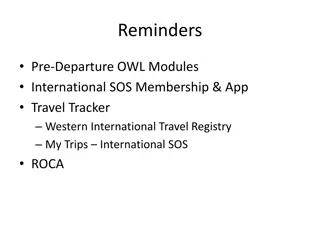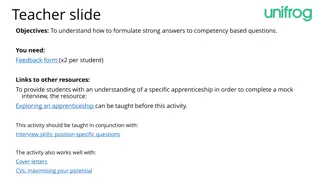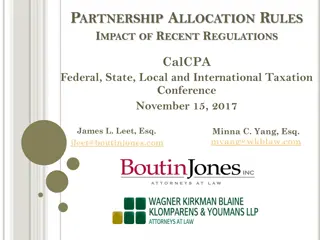Competency Determination Regulations Overview
A comprehensive overview of the Competency Determination Regulations in Massachusetts, highlighting key milestones, historical timeline, proposed updates, considerations from the advisory committee, and MCAS retests and appeals. The content covers the establishment of competency determination, evolution of regulations, proposed changes, and support mechanisms for students to meet the standards.
Download Presentation

Please find below an Image/Link to download the presentation.
The content on the website is provided AS IS for your information and personal use only. It may not be sold, licensed, or shared on other websites without obtaining consent from the author.If you encounter any issues during the download, it is possible that the publisher has removed the file from their server.
You are allowed to download the files provided on this website for personal or commercial use, subject to the condition that they are used lawfully. All files are the property of their respective owners.
The content on the website is provided AS IS for your information and personal use only. It may not be sold, licensed, or shared on other websites without obtaining consent from the author.
E N D
Presentation Transcript
Competency Determination Regulations August 2022
Historical Timeline of the CD Milestones 1993 Competency Determination established by the Education Reform Act 1998 First MCAS tests given 2003 First graduating class held to the CD 2006 Regulations revised to add science as well as the Educational Proficiency Plan (EPP) for ELA and mathematics Feb. 2018 Board adopts interim standard for classes of 2021 and 2022 Spring 2019 First administration of grade 10 next-generation tests in ELA and math April 2020- April 2021 Sept 2021 Board votes to allow students in certain classes to earn their CD through a modified process, in recognition of missed MCAS testing opportunities over the course of the pandemic. Board extends interim CD standard to the classes of 2024 and 2025 2020-2022 Convening of CD Advisory Committee (to consider how best to align the CD threshold cut scores with the achievement levels and expectations of the next-generation tests) Board discussion of proposed changes to regulations and vote to send for public comment April 2022 April-June Public comment period August 2022 Discussion and vote on proposed changes to regulations 2 Massachusetts Department of Elementary and Secondary Education
Summary of Considerations from CD Advisory Committee The evidence heard by the committee underscores the importance of raising the CD standard beyond the current legacy-equivalent cuts. o Longitudinal data shows that students who score at the current CD cuts have poor academic and earnings outcomes, including lower wages by age 30 than students who score at higher level At the same time, the Commissioner and the Board must focus on: o Creating clear and accurate messaging regarding MCAS achievement and the CD standard o Providing better/increased communication to schools, districts, parents, and students around pathways to the CD for students who do not meet the standard on their first attempt o Improving the implementation of the EPP and other supports for student learning 3 Massachusetts Department of Elementary and Secondary Education
Proposed Updates to Regulations: Current and Proposed CD levels Current PROPOSED Next-generation cut score, EPP still required for ELA & math 470 470 470 Current PROPOSED Next-generation cut score, no EPP required Subject Legacy-equivalent cut score, EPP still required for ELA & math 455 469 TBD following standard setting this summer Legacy-equivalent cut score, no EPP required ELA Math STE (EPP not required) 472 486 n/a 486 486 n/a 4 Massachusetts Department of Elementary and Secondary Education
MCAS Retests and Appeals Ongoing and alternative opportunities for students to earn their CD, if they fail (or miss) their first attempt 1. Retests 2. Cohort appeals 3. Competency portfolio appeals Part of the MCAS program since the adoption of the CD in the early 2000s 5 Massachusetts Department of Elementary and Secondary Education
Additional pathways Transcript appeals for students who arrive in MA schools after final retest opportunity in grade 12. Students in military families who move to Massachusetts in high school. o Transcript of relevant courses taken in current and previous high schools o Standardized test scores (e.g., SAT, ACT, state high school assessment, state exit exam) o Completed cohort worksheet, if student has taken a high school MCAS test in the subject of the appeal and completed at least two quarters of a relevant course. o College acceptance letters, academic awards, scholarships 6 Massachusetts Department of Elementary and Secondary Education
Proposed Updates to Regulations: EPP Updates to the components of the Educational Proficiency Plan (EPP) o A requirement that the school provide a student s EPP to their parents/guardians on an annual basis o A requirement to describe the tutoring or other individualized academic supports the student will receive o Expectations for students who are actively enrolled and successfully progressing in the Mass Core curriculum, an approved Chapter 74 vocational-technical program, or a designated Early College or Innovation Pathway program o Clarifications to the types of courses and assessments required in a student s EPP o Clarifications around the expectation for adult learners, students who have exited high school without a CD, seniors who have already completed all their required courses in the relevant subject matter, students who are not continuously enrolled or are enrolled in an alternative program, and students who enroll in senior year 7 Massachusetts Department of Elementary and Secondary Education
Summary of public comment 229 emails received from a wide range of stakeholders, including educators, parents, students, and community members Comment from 10 organizations and school districts/committees Massachusetts Teachers Association Multistate Association for Bilingual Education Northeast American Federation of Teachers - Massachusetts Education Reform Now Advocacy Massachusetts Association of Speakers of Other Languages Boston Public Schools Massachusetts Business Alliance for Education Massachusetts High Technology Council Dedham School Committee Norton School Committee and Public School District Frequently mentioned topics o Impact on student populations such as English language learners and students with disabilities o Prioritization of access to alternate pathways to graduation o Ongoing effects of interrupted learning during the pandemic o The need to prepare students to meet the increasing rigor of college and career 8 Massachusetts Department of Elementary and Secondary Education
